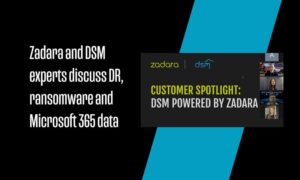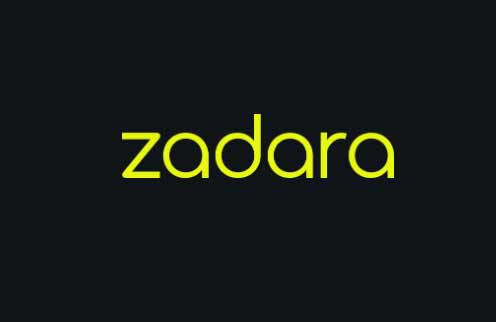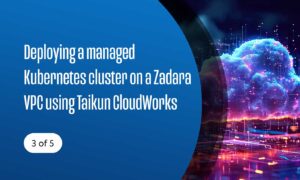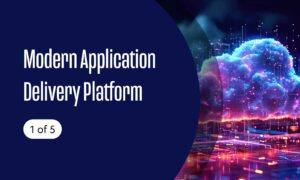You can never be too prepared for ransomware and other business continuity challenges. The nature of the threat is always changing, but the risk to your business – or your customer’s business – is constant.
Hearing from experts in the field is a great way to increase your knowledge, assess your readiness, and make sure your backup and DR investments are delivering value.
So, who better to hear from than the experts on our latest video Q&A?
Frankie Majowich is VP of Technology at DSM, a Florida-based data assurance provider for commercial, government and compliance-bound (especially CJIS) agencies. DSM’s solutions are powered by Zadara Edge Cloud Services with enterprise-grade infrastructure that is fully managed, provides elastic scale, and delivered with our 100%-OpEx model at 400 locations around the world. Majowich is joined by Noam Shendar, Zadara’s VP of Worldwide Solution Architecture.
Watch the two dive into topics including data assurance, Microsoft 365 backup, and the architectural features to look for in solutions in our 18-minute webinar. It’s a must watch for DR providers and end-users who are looking to strengthen their data protection solution.
Click below to watch it now or scroll on down for some of the talking points.
Overlooked advantages of 3-2-1-1-0
Data assurance is about having peace of mind that your data is going to survive intact no matter the threat, and that it can be used to recover your environment.
The best way to make sure of this is to follow Veeam’s 3-2-1-1-0 rule, which means having three different copies of your data, on two types of media – one of those being offline and one air-gapped. Following this rule has additional benefits that are often overlooked.
“One overlooked practice is to do testing, reporting, and security scans on your backup data,” says Majowich. “By running these processes on your backup data, you can limit the performance impacts on your production environment.”
“The zero in 3-2-1-1-0 is a very important addition,” adds Shendar. “It means zero defects in the data, and it gives peace of mind that the data that is there will successfully restore if necessary.”
Ensuring business continuity in a disaster scenario
But not even a zero-defect backup is enough to guarantee business continuity following a disaster or cyber-attack. Organizations also need to consider partnerships and geography.
“One way is to leverage a service provider that is out of band of your infrastructure,” explains Majowich. “This provides a separate control plane, a security boundary to ensure your data is safe. And you can utilize technologies like immutability and air-gapped backup, so your data can’t be changed or deleted.”
“It’s better if your backup sites are distant from each other,” says Shendar, “and this is where a solution provider like DSM, which uses Zadara to offer services across hundreds of locations, can help. It’s easy to find two locations that are suitable geographically.”
Partner or hyperscaler?
And there are more advantages of partnering with a nearby provider, compared to buying services directly from one of the big public cloud hyperscalers. Especially when your solution leverages Zadara Edge Cloud Services.
A key benefit of DSM’s Zadara-powered solution is the absence of multi-tenant “noisy neighbors” who use more than their share of resources and impact performance of your solution.
“DSM solutions leverage Zadara’s patented VPSA architecture to deliver a single tenant experience with the cost-benefits of a multi-tenant solution,” says Shendar. “There are no shared resources, it’s fully elastic, and each tenant has full control over their performance. It’s the best of all worlds.”
“DSM customers also get a level of service that isn’t available from hyperscalers who deal with a mass audience,” continues Shendar. “That personal touch makes a huge difference.
“We’ve really enjoyed working with DSM because they’re very easy to work with, and very professional.”
The hidden challenge of protecting Microsoft 365 data
Some organizations assume data they store in a third-party cloud service, such as Microsoft 365, is protected for them by the provider. But this isn’t always the case, and losing Office data can have a huge impact on business continuity.
“A lot of people don’t know that Microsoft has what it calls a shared responsibility model, where the client is responsible for the data that resides in Microsoft 365,” explains Majowich. “It’s your data and you’re responsible for it, and that’s where Zadara and DSM can help make sure it’s available when you need it most.”
Click below for the full discussion on topics including air-gapping, DR challenges facing SLED organizations, and how the ransomware conversation has changed over the past year.





